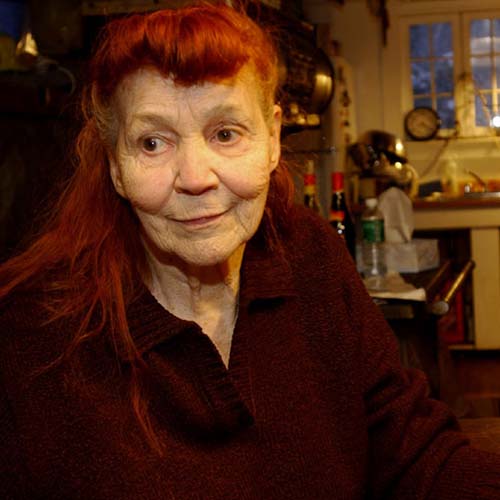Visiting Poets
Ruth Stone
1999 saw the celebration of Ruth Stone‘s eighty-fourth birthday and the publication of her eleventh book, Ordinary Words, winner of the Eric Mathieu King Award from the Academy of American Poets. A Virginia native and professor of English at the State University of New York, Binghamton, Stone is the recipient of many honors, including the Bunting Fellowship, Guggenheim Fellowships, the Delmore Schwartz Award, the Shelley Memorial Award, and the Cerf Lifetime Achievement Award from the state of Vermont, where she has lived for many years.
The poet Sharon Olds calls Stone’s work “dazzling, original, fearless, funny, and deeply moving.” Southern Illinois Press recently published a book about her life and work, The House Is Made Of Poetry, edited by Sandra M. Gilbert and Wendy Barker. Stone’s work is highly accessible and provocative, and crosses lines of class, race, and age. Her other collections include Second-hand Coat (David R. Godine) and Simplicity, published by Paris Press, the feminist press based in Ashfield, MA., which also published Ordinary Words.
Select Poems
This borrowed pressed-wood table
is molecularly unhooked in parceled impulses,
stored in my lobes where Adolph Hitler
is also shredded, his repulsive
mustache distributed throughout
my eclectic electrical system.
But that’s not all. His hoarse disembodied voice,
without a decibel, still shouts,
goose-stepping through my cracked
cranium. As now, another snowfall
sculptures an unreality, clean and fresh,
bringing down in its light crystals
industrial particulates as it settles.
Out there, a miracle;
in here, disassembled,
encoded visually, linguistically,
tagged with the rest of the garbage
that my brain recycles, that is myself;
this cumulative trash that goes with me.
From ORDINARY WORDS (Paris Press, 1999)
Driving the perfect fuel, their thermonuclear wings,
into the hot layer of the sugar’s chromosphere,
hummingbirds in Egypt
might have visited the tombs of the Pharaohs
when they were fresh in their oils and perfumes.
The pyramids fitted,
stone slab against slab,
with little breathers, narrow slits of light,
where a few esters, a sweet resinous wind,
might have risen soft as a parachute.
Robbers breached the false doors,
the trick halls often booby traps,
embalming them in the powder of crushed rock.
These, too, they might have visited.
The miniature dagger hangs in the air,
entering the wild furnace of the flower’s heart.
From ORDINARY WORDS (Paris Press, 1999)
Wallace Stevens says,
“A poet looks at the world
as a man looks at a woman.”
I can never know what a man sees
when he looks at a woman.
That is a sealed universe.
On the outside of the bubble
everything is stretched to infinity.
Along the blacktop, trees are bearded as old men,
like rows of nodding gray-bearded mandarins.
Their secondhand beards were spun by female gypsy moths.
All mandarins are trapped in their images.
A poet looks at the world
as a woman looks at a man.
From ORDINARY WORDS (Paris Press, 1999)

